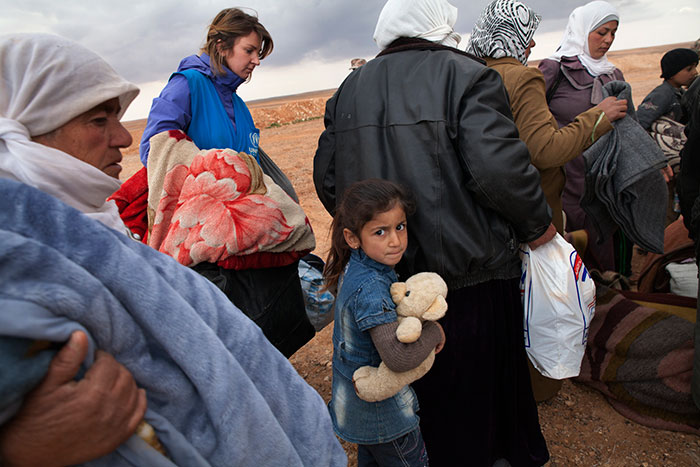March 13, 2015

On the fourth anniversary of the uprising in Syria, effective and sustained efforts are urgently needed to end the horrific suffering of the Syrian people, who face daily the risk of mass atrocities and the threat of genocide. The number of Syrians killed in the conflict exceeds 200,000; many of the victims are civilians who were targeted for their perceived political or religious allegiance. Over half the population has been displaced, often multiple times, and more than 12 million Syrians are now in urgent need of humanitarian assistance.
Four years ago, when Syrians peacefully demonstrated for democratic reforms, the regime of President Bashar al-Assad responded with brutal violence. After some opponents took up arms, the regime’s violent tactics escalated and largely targeted the communities of Syria’s Sunni religious majority. Tens of thousands of Syrians have died in regime detention, and as photographs on display at the Museum clearly demonstrate, many were subjected to starvation and torture—including children. The regime has intentionally attacked communities with chemical and incendiary weapons and cluster munitions. It daily shells and bombs civilian sites, including markets, schools and hospitals. Various opposition forces have also targeted civilians with indiscriminate attacks and outright massacres. The UN’s Independent International Commission of Inquiry on the Syrian Arab Republic has documented an “exponential” increase in crimes against humanity and war crimes committed against civilians by the Syrian government and, on a smaller scale, by opposition forces.
Syria demonstrates how, when left unchecked, mass atrocities can profoundly impact international security. The regime’s targeting of Sunni communities transformed the political uprising into a sectarian conflict that has spread into Iraq and Lebanon, greatly exacerbated regional tensions, and attracted tens of thousands of foreign fighters—including from Europe and the United States—who aim to wage jihad in Syria and to carry this crusade back to their home countries. One direct consequence of the uprising’s transformation into a sectarian conflict has been the rise of the self-proclaimed Islamic State (IS), which has seized control of large portions of both Syria and Iraq and has made clear its genocidal intentions toward certain groups. While the murderous brutality of IS has attracted considerable attention worldwide, the Syrian regime’s deadly tactics continue to target vastly larger numbers of civilians.
The Syrian conflict has become the largest humanitarian emergency the world has seen since World War II and international response remains woefully inadequate to end Syrians’ sufferings or address their needs. Although the UN Security Council approved resolutions a year ago authorizing cross-border humanitarian aid and calling for an end to crimes against civilians, these have not led to any significant improvement. Both sides routinely block deliveries of humanitarian aid from reaching communities in desperate need and attack and detain humanitarian aid workers, while mass atrocities perpetrated against civilians continue to escalate.
After the Holocaust, the world vowed Never Again. After the genocides in Rwanda and Srebrenica, the world made a new commitment to protect populations from genocide, war crimes, crimes against humanity, and ethnic cleansing. The world must not now ignore its obligation to come to the aid of Syrian civilians, who are being daily tortured, starved, raped, and killed because of who they are or what they believe. The threat of genocide hangs over the population. If we do not address this threat, the consequences will fall not just on Syrians, but on all of humanity.
View All Blog Posts